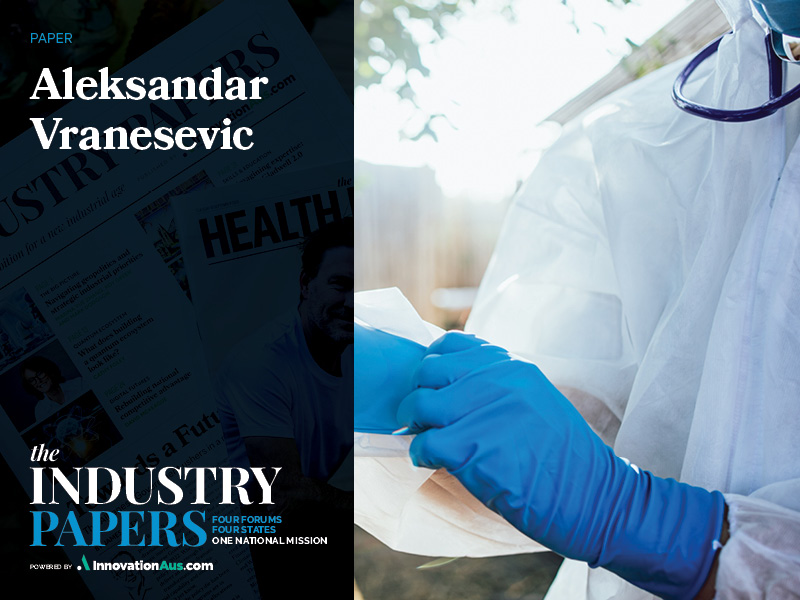Biosecurity is critically important to Australia’s national interests as an island continent and major agricultural exporter.
With over two-thirds of Australia’s land area dedicated to agriculture – which accounts for 44 per cent of our total exports – maintaining a robust biosecurity system is vital for safeguarding the country’s economic prosperity and food security.

However, Australia’s biosecurity capabilities must undergo transformative changes to meet the challenges of the twenty-first century and to maintain the nation’s competitive advantage.
The imperative for reform
It is widely recognised that investment in biosecurity needs to be treated as an industry-wide investment, requiring a whole-of-economy approach from both government and the private sector to safeguard Australia’s competitive advantage.
A key question is: can we use this investment to create spill-over benefits in new and innovative technology products and an ecosystem of ideas that can be used, not just domestically, but also exported to our trading partners?
The critical component of this necessary reform is achieving data and digital interoperability, not only across the supply chain but also spanning government boundaries.
Illustrating the crucial role of R&D initiatives to boost the economic strength of Australian agriculture, research from the Australian Bureau of Agricultural and Resource Economics (ABARE) reports an almost eight dollar return for every one dollar spent over a decade.
The opportunity: An integrated biosecurity platform
Australia already operates state-of-the-art biosecurity facilities, novel operational technologies and advanced data and digital capabilities to manage the risk of biosecurity incursions. Think of the high-tech post-entry facilities for live animals, large scanners at seaports, analytics profiles in mail sorting centres or handheld eDNA devices for inspecting containers.
What’s missing is the interoperability required to turn individual point technology solutions into an industry-wide platform. By better coordinating individual technology and capital investments, we can turn biosecurity products into an industry, generating new ideas and investments that help us stay at the forefront domestically while also creating opportunities to export our biosecurity know-how.
The CSIRO agrees that biosecurity innovation has the potential to protect and enhance Australia’s economic, agricultural and environmental interests. By 2030, the agency hopes to have been instrumental in supporting a technologically and digitally-enabled national biosecurity system which is responsive to new and emerging threats and system challenges.
Scaling proven capabilities
While innovation and research are crucial, there is an urgent need to scale biosecurity capabilities and solutions on the ground. The CSIRO’s biosecurity mission fills a need for long-term mission-oriented investment in biosecurity innovation over 10 years.
However, there is a need to create a nearer term outcome that sees digital and data products trialled with government as the early adopter.
Once proven to work, these solutions should inform interoperable standards that the government, supply chain, and technology companies can adopt, build upon, and deploy domestically and export overseas.
Think of the way the tax code has been turned into data reporting and compliance standards available seamlessly through a range of products and services such as MYOB or Xero.
If Australia capitalises on this opportunity, it can leverage its domestic biosecurity investment to safeguard the nation’s trade interests in primary production and food exports, while simultaneously developing an industry base.
Most of the opportunities in this space (such as technologies and standards for real-time detection, diagnostics and reporting) combine practical on-the-ground applications in regions and across the supply chain with advanced software engineering, scientific expertise, electronics manufacturing, materials handling and edge connectivity.
Acting quickly to synchronise investments in key biosecurity technologies such as detections, diagnostics, digital certificates, and traceability gives us the best possible chance to turn these pockets of innovation into an industry standard that can be backed by long term industry investment and scaled to meet the future biosecurity challenges.
Australia’s expertise in operational technology, paired with our robust information management capabilities, uniquely positions us to lead the global digital transformation of biosecurity.
This alignment prompts vital discussions on data standards, interchange, ownership, and sharing – the cornerstone of the biosecurity industry system, propelling the industrial base into the twenty-first century.
Conclusion
Australia can turn its biosecurity system into a comparative advantage for new industry products and services. By bridging the gap between long-term innovation investment and near-term outcomes we can position Australia as a global frontrunner in biosecurity expertise and an exporter of this know-how.
Through the development of an integrated digital biosecurity platform that harnesses operational technology and information management strengths, Australia can enhance domestic agricultural productivity, streamline trade supply chains, and drive innovation in biosecurity technologies.
Setting the standards for interoperability provides the industry with certainty and positions the nation as a provider of biosecurity solutions to regional partners.
Critically, this biosecurity capability would enable Australia to export its know-how and expertise to bolster biosecurity resilience among neighbouring nations. In doing so, we could mitigate risks closer to their sources while deepening economic and diplomatic ties throughout the Indo-Pacific region.
The path forward demands a commitment to system-wide digital transformation, public-private collaboration, targeted investment in scaling on-the-ground capabilities, and positioning Australia’s biosecurity expertise as a valuable export across the region.
By seizing this opportunity, Australia can futureproof its status as an agricultural trade powerhouse, buttress its national biosecurity resilience, and emerge as a global leader in this critical domain for decades to come.
Aleksandar Vranesevic, co-founder and partner, Reason Group. The Australian business and technology services firm focuses on delivering digital GovTech and interoperability solutions. Aleks has spent two decades working on some of Australia’s larger reforms across the tax, superannuation, trade, immigration, health and social services portfolios.
This article is part of The Industry Papers publication by InnovationAus.com. Order your hard copy here. 36 Papers, 48 Authors, 65,000 words, 72 page tabloid newspaper + 32 page insert magazine.
The Industry Papers is a big undertaking and would not be possible without the assistance of our valued sponsors. InnovationAus.com would like to thank Geoscape Australia, The University of Sydney Faculty of Science, the Semiconductor Sector Service Bureau (S3B), AirTrunk, InnoFocus, ANDHealth, QIMR Berghofer, Advance Queensland and the Queensland Government.
Do you know more? Contact James Riley via Email.

